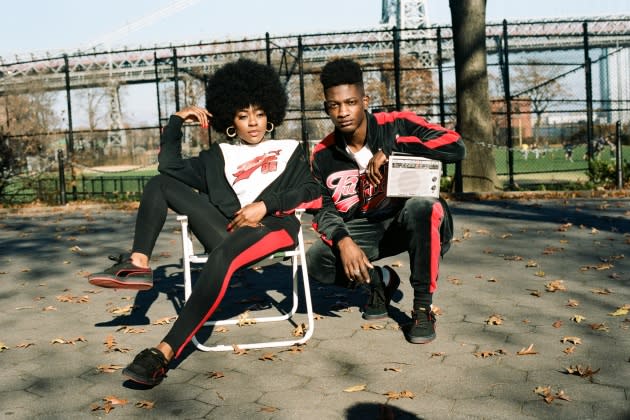Y2K Is Slowly Returning in Streetwear
- Oops!Something went wrong.Please try again later.

Thanks to Gen Z shoppers, Y2K is back.
The styles from the early Aughts have returned to the runway and streets through baggy jeans, longer shirts, short sleeves past the elbow on men, and cropped tops, baby T-shirts and cutout dresses for women.
More from WWD
Designers such as Telfar Clemens, Mowalola and Bstroy are modernizing tight T-shirts and bootcut jeans, hearkening back to Paris Hilton in the “Simple Life” or Lenny Kravitz at the height of his music career.
But what does the return of Y2K style look like in streetwear?
Look no further than the resurgence of the Nike Air Force 1, a staple footwear style from the early Aughts popularized by rappers who claimed to never wear a single pair more than once and Nelly, who created a hit song, “Air Force Ones,” in which he demands two pairs of the all-white sneaker silhouette.
Beyond that style, Nike also revived the Nike Dunks sneakers, a coveted style in the 2000s for the Nike Dunk SB skateboard series. This year alone, the black and white low-top “Panda” Dunks have been spotted on twentysomethings just as frequently as the Air Force 1.
Adidas also has been reviving its Y2K sneaker styles, including the Crazy 1 “Stormtrooper” sneaker that debuted on Kobe Bryant in the 2000 NBA Finals, while he was signed with the company. The “dad shoe” trend led by the Yeezy sneaker line and capitalized on by New Balance brought the style back before 2020, but now the sneaker game is in full Y2K swing.
The early Aughts were a distinctive time for streetwear beyond footwear — clothing, trends and sneakers of the time reflected music and sports influences. While ’90s brands including Fubu, Mecca and Enyce took over the streets, Sean “Diddy” Combs, Jay-Z and Russell Simmons — moguls who made their names in music — set the tone in streetwear with Sean John, Rocawear and Phat Farm, respectively.
The Y2K nostalgia resurgence started percolating before 2020, with Pyer Moss designing collaborations with Fubu and Sean John, and with consumers who created archive social media pages centered on 2000’s fashion and pop culture. These moves provided more runway for longstanding streetwear brands to reclaim their positions in the market.
Fubu on Aug. 27 released merchandise with Black Fashion for its Museum World Tour exhibition at the Brooklyn Museum curated by Black Fashion Fair. Diddy reacquired Sean John this year with the goal of taking the brand back to prominence, and Avirex, a leather jacket brand that became popular on hip-hop acts in the late ’90s and early 2000s, also announced a comeback.
Hip-hop artists leaned on sports for their fashion statements, donning jerseys from current stars or throwbacks nodding to the stars of yesteryear. They accessorized with headbands, wristbands and caps for baseball and basketball teams. A popular cap from New Era featured the logos of every current NBA franchise up to that date, which was also seen on jackets and jeans in the era. New versions of these caps have emerged this year, building on consumers’ new love affair with fitted caps.
Finally, denim brands like Evisu made huge waves in the decade with rappers like Lil Wayne, who would show off the back pocket art on stage and in music videos. Although the brand fell out of the denim conversation in recent years, it aims to reenter the fray with the revival of its 2000s Baggy Fit and a new store in New York City’s SoHo.
Sign up for WWD's Newsletter. For the latest news, follow us on Twitter, Facebook, and Instagram.
